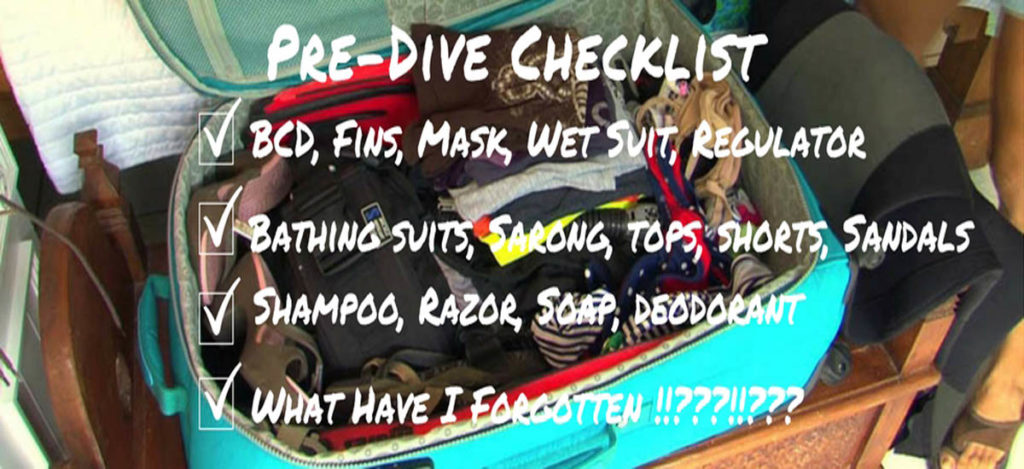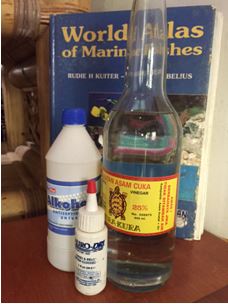
Pre-Dive Check List 10 Tips for Diving in Remote Areas
Warning, some content may be complete rubbish, some of the healing effects may be all in my head! This information is based on my observations, good old common sense, and stuff I’ve learned along the way as a working dive professional.
Are you traveling to an exotic dive destination soon? Maybe you’re in the planning stages or it’s fully paid and you’re just waiting for your departure date. After many years of working in the dive industry in Indonesia, I would like to pass along my shortlist of MUST DO’s to prevent possible issues and keep you in the water diving the entire trip, plus a few additional tips just for the heck of it.
Don’t Let Current Ruin a Good Dive Vacation
So you’re in the planning stages and you hate current?! STOP right there. What I really, hear is “I hate fighting current”! Many dive destinations have current, Indonesia included. Just because you may have had a hard time in current in the past doesn’t mean, with the right dive briefing and guide, you can’t enjoy it this time. That being said, besides learning to dive or “hide” in current properly and “going with the flow,” I would suggest looking at a tide chart for the destination and time you wish to go because tides are different throughout the month. To ensure that you are not diving during a huge tidal exchange, where large bodies of water have to move – creating strong current – look at a local tidal chart before you book. Here are a few indications of possibly strong currents:
- Large tidal exchanges 1.5 – 3 meters +
- New Moons and full Moons (especially new moons
- Spring Tides (neap tides are usually o.k.)

Also, think about where you are going. Are you diving around small islands and in passages where these large tidal exchanges are magnified? Think of tides as seasons, do you take the time to look at and consider seasons when booking a holiday (any holiday)? Do you want to go on a tropical vacation during the rainy season? No, well the same thing applies with tides; if you don’t want strong current then check the tide tables! One thing to note; The fish love current, that’s where you’ll find them, at the head of the current. On the other hand, if you like a challenge and good reef action and predation, pick a time with a large tidal exchange, grab your reef hook and dive in!
Don’t Service Your Regulator
Actually, what I meant to say was…do you usually service your gear shortly before your yearly dive trip? Well DON’T! Service it in advance of a major dive trip and then use it at least twice before you come. Why? Because technicians want to return your regulator adjusted to give you the easiest breathe possible. Sometimes, they’ve over adjusted and you get free flow, and sometimes they’re too conservative and you get a really hard pull. Either way, if the service is not done properly, you’ll have a regulator you may not be able to use during your trip. So, unless you are staying at a resort or aboard a liveaboard that has a trained service technician you’ll have to use a rental. By testing at home before your trip (even if it’s in a pool) you’ll know if it’s been serviced properly and the way you like it.
Upset Stomach (a.k.a. Bali Belly, Divers’ Diarrhea)
Exotic destinations usually have exotic food. Many stomachs are not used to the spices and ingredients used in the local cuisine. Fear not! First, make sure you can make food requests where you are going and second, get some acidophilus pills and probiotics before you come. Start populating that belly at least 2 weeks with good bacteria before you get on the plane. Jeez, speaking of planes! Build up that immune system before you get in that steel tube with 300 strangers, carrying germs. I use Immune+ Energy C. Of course, speak to your doctor about any additional medications, they would recommend you take along.
Exercise Those Ears or They Will Punish You
Fast forward to a week before departure and you are getting excited. As a diver, you know equalizing your ears is important. But have you thought about how much extra work you are asking your eardrums to perform on a dive trip? Would you start jogging 5 miles a day after a 6-12 month hiatus or longer? Your muscles would be killing you! But that’s what you’re asking your ears to do on a dive trip. And don’t forget the plane, they have a lot of work to do there too. So what do you do? Start exercising those eardrums and eustachian tubes. How? You already know how, by gently equalizing the ears. Start doing it a week before you leave, a couple of times a day to get them back in shape before you put them into shock diving 4 times a day for 7-12 days.
Could You Pick up a Few Items on My Shopping List?

Before your departure, I’ve got a small list for you to pick up at your local pharmacy.
Without a doubt, dehydration is one of the biggest problems we see on dive trips. So, take Oralit or some other type of rehydration packs, if you can’t find any get powdered Gatorade. Start drinking these the night before you’re scheduled to fly. Drink them regularly, especially on a tropical dive holiday. If you are lucky enough to be offered fresh coconut juice, drink it, it’s nature’s best electrolyte!
Make sure you bring Ibuprofen. Often times the eustachian tubes get a little inflamed from all that pressure and equalizing. Ibuprofen is an anti-inflammatory that can help. Word of caution here, it is best to use the Ibuprofen at night so the pain-relieving effects do not cause you to over-equalize. Of course, check with your doctor before taking any medications.
These first two items on the shopping list are so important Adelaar Cruises and Tambora Cruises carries them on board in their medical kit. But it’s a good idea to bring your own.
Make up a bottle of ear juice or buy a swimmer’s ear drops. Indonesian waters, including the waters around Komodo, have tons of nutrients floating around in the water, these nutrients feed the reefs and soft corals. These little nutrients just loooove to find warm, wet and dark places to grow. With a drop in each ear after your dive, you’ll stop them before they cause a problem.
Photo: Water, Ibuprofen and Oralit – A MUST have!
My Blisters Have Blisters!
Let’s face it; blisters are no fun! You could bring along a box of band-aids and re-tape after every dive…or I’ve found an easier, cheaper solution. You know the free socks you get on planes. Take them with you. They are usually pretty thin, so they won’t affect the fit of your fins or booties, but thick enough to protect your feet from blisters. As an added bonus, if you have full foot fins, they protect your ankles from stinging hydroids.
Struggling Into a Wetsuit is the Worst Part of Diving!
Until someone comes up with a spray-on wetsuit, this will be a problem for many. The easiest solution I’ve found is a solution of 1/2 fabric softener and 1/2 water. Mix it up in a spray bottle and spray conservatively to the feet, hips, and arms to create a slick surface on your skin. Make sure you purchase an environmentally friendly fabric softener, such as Attitude‘s pink grapefruit fabric softener. They sell a wide range of eco-friendly household products online. A second option would be Greenshields, lavender mint available at Whole Foods or online.
Adaptor vs. Converter
An adaptor is designed to “adapt” your electronic equipment plugs to the socket of the plugin the wall. These can easily be picked up for about $2 in Indonesia. A converter “converts” the current from a higher voltage to a lower voltage. Many countries use 220 voltage. If you look at either the device or the charging cable for the device, it will usually say the minimum and maximum input acceptable. These days most electronics will accept 100v-240v. However, I have found most hairdryers, electric razors, electric toothbrushes and water-pick from countries (like the U.S.) that use 110v will NOT take 220 so you may need to get a converter.
Please…Can I Get a Signal?!?
Check to see if your smartphone is unlocked before you leave home. If not, see if you can get your provider to unlock it. If it’s already unlocked or if they’ll unlock it, GREAT. When you get to your international destination buy a local SIM card. Many countries have cheap pay-as-you-go plans. In Indonesia, for example, for less than $20 you can have a decent amount of credit for long-distance calls, and around 4gb of data that is good for up to one month. Surprisingly Indonesia has pretty decent cell coverage. If your provider won’t unlock it, you can check into an international text package, often available by the month, that will allow you to stay connected. Or you can pick up a cheap phone at your destination, Indonesia has Nokia’s for $20.
Sunscreen A Double-Edge Sword.

If you are reading this, we assume you are a diver (or a snorkeler). You probably like to look at healthy beautiful reefs, am I right? Think about picking up a reef safe sunscreen, who knew something that can be so important to protect our skin could be so detrimental to the very things we love.
It’s Your Duty!
Lastly, when traveling it’s usually a good idea to bring your duty-free liquor allowance. In places like Indonesia, it can be difficult to find wine and liquor. If you’re lucky and it’s available you’ll probably pay a small fortune. Even if you don’t consume alcohol, pick up a bottle of something for your dive guide or cruise director; they will love you for it (only to be consumed off duty)! If you are flying Singapore Airlines, make sure you use the free $40 voucher provided at the Changi iShop.